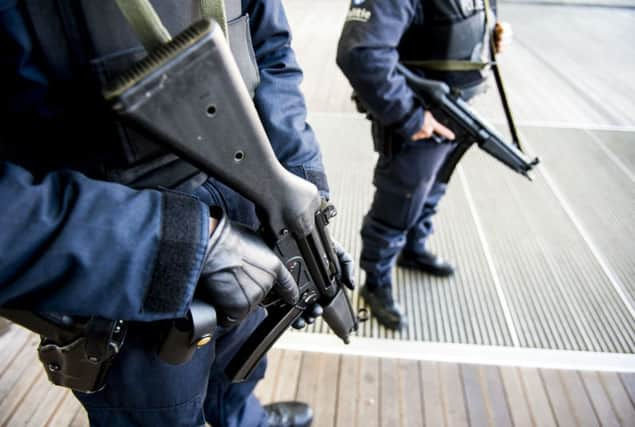Leaders: Let’s discuss arming our police


Two of the suspected terrorists were killed in a raid on a house, a further 13 suspects have been arrested, and two more suspects have been arrested in France. It is a near certainty that other groups of would-be jihadists are planning to perpetrate the same horror against people in uniform, including in Britain.
The new threat facing Europe is of thousands of Islamist fanatics, according to the head of Europol, Ron Wainwright. Many of them are not operating under any central command whose communications can be intercepted, and they are working in tightly-knit groups who may leave little if any electronic chatter.
Advertisement
Hide AdAdvertisement
Hide AdIf police officers are a more likely target for these murderers than other sections of society, isn’t arming those officers the right course of action? This would at least allow them not only to defend themselves but in the process kill terrorists bent on committing as much murder as possible. Should the British public not be giving their police officers the same protection as their continental European counterparts have?
CONNECT WITH THE SCOTSMAN
• Subscribe to our daily newsletter (requires registration) and get the latest news, sport and business headlines delivered to your inbox every morning
This is a highly controversial question. The main argument against arming every police officer has been that it would raise the stakes of criminal activity and more or less ensure that criminals armed themselves, putting more civilian lives at risk. Strict gun laws also make weapons much scarcer and armed crime rarer than in societies with laxer laws.
This, however, is not about robbers, but an extraordinary threat in which guns are certain to be used. And strict though British laws are, assault weapons as well as handguns can be obtained by those determined to do so.
If this is a question to be discussed, then it has many aspects. If police officers in uniform should be routinely armed, should that apply also to plain-clothes officers? Should they also be able to carry weapons while off duty? Should off-duty armed forces personnel have the same right? Should soldiers on ceremonial duties whose weapons are not loaded in fact be carrying loaded guns? Or would this encourage a proliferation of weapons which poses its own increased danger to life?
Scottish public and political opinion was shocked to learn when police officers were seen with handguns on their hips that armed patrols had become routine. The problem was as much that it had not been discussed as it was that it was happening. That is why this is a question that needs a full public and political discussion, and preferably before an atrocity in which unarmed police officers are killed.
A wonderfully British ‘failure’
Britain’s bold mission to Mars to seek out signs of old life on the red planet was tantalisingly much closer to success that had been suspected.
The mission, delightfully labelled Beagle 2 (named not after the dog, but after HMS Beagle which carried Charles Darwin on the expeditions which led to his world-changing theory of evolution), launched in the summer of 2003 and, reaching the Martian surface six months later, was thought to have crashed and been wrecked when no signals came back from it.
Advertisement
Hide AdAdvertisement
Hide AdBut now high-resolution pictures from a Nasa orbiting craft have identified Beagle intact and on the surface pretty much exactly where it was supposed to be. Analysis seems to have proved that all that went wrong was that some of the solar panels which should have folded out to provide it with the electricity to power its gadgetry did not, preventing radio communication.
At the time, the silence in the void was dismally depressing for the scientists and engineers who had worked so long on it, none more so than for Prof Colin Pillinger, whose dream it was, and whose determination drove the whole project.
With splendid eccentricities, such as a mission call sign recorded by Blur, a test card for calibrating camera and spectrometer images painted by Damien Hirst, and at a cost of about £50 million, less than half contributed by the taxpayer, making it one of the cheapest interplanetary missions ever mounted, it was a wonderfully British affair. And now the failure does not seem so total and the lessons learned are to be used on Europe’s next mission to Mars in 2019. Prof Pillinger, now sadly deceased, would be pleased.
SCOTSMAN TABLET AND IPHONE APPS